How to Stop Budworms from Eating Your Flowers
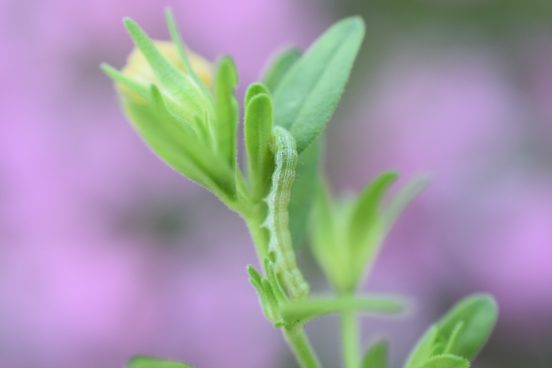
I have a confession to make. I’ve been a bad plant mama. To my petunias and geraniums at least. Life got in the way of gardening, I stopped spraying my plants for budworms, and all hell broke loose.
Disclaimer: when you shop through my affiliate links I earn a small commission which helps me create more content, at no additional cost to you! Thank you so much for your support!
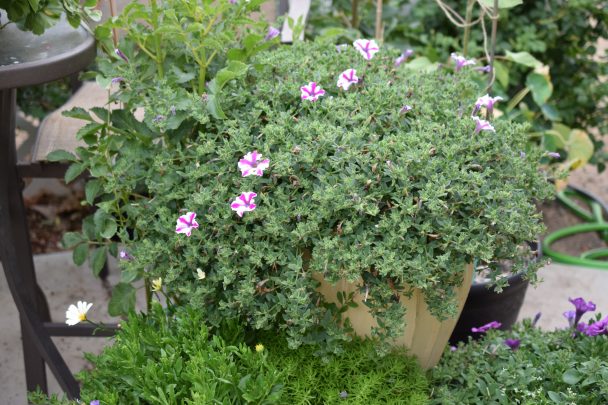
How to Tell That Your Plants Have Budworms
I have been looking at tattered and barren petunias, including the one in the above photo, for about 3 weeks now. It sucks. Budworms are the culprits. How do I know this? Because every night for the past two weeks I have been picking the little beasts off my plants by the dozens. I pick them off in the morning as well, and sometimes even midday. I haven’t been able to visit the garden without feeling like I have to do the “budworm hunt”. They just don’t stop coming. Every year I battle budworms all summer long until the weather gets cooler. But this year has been the worst.
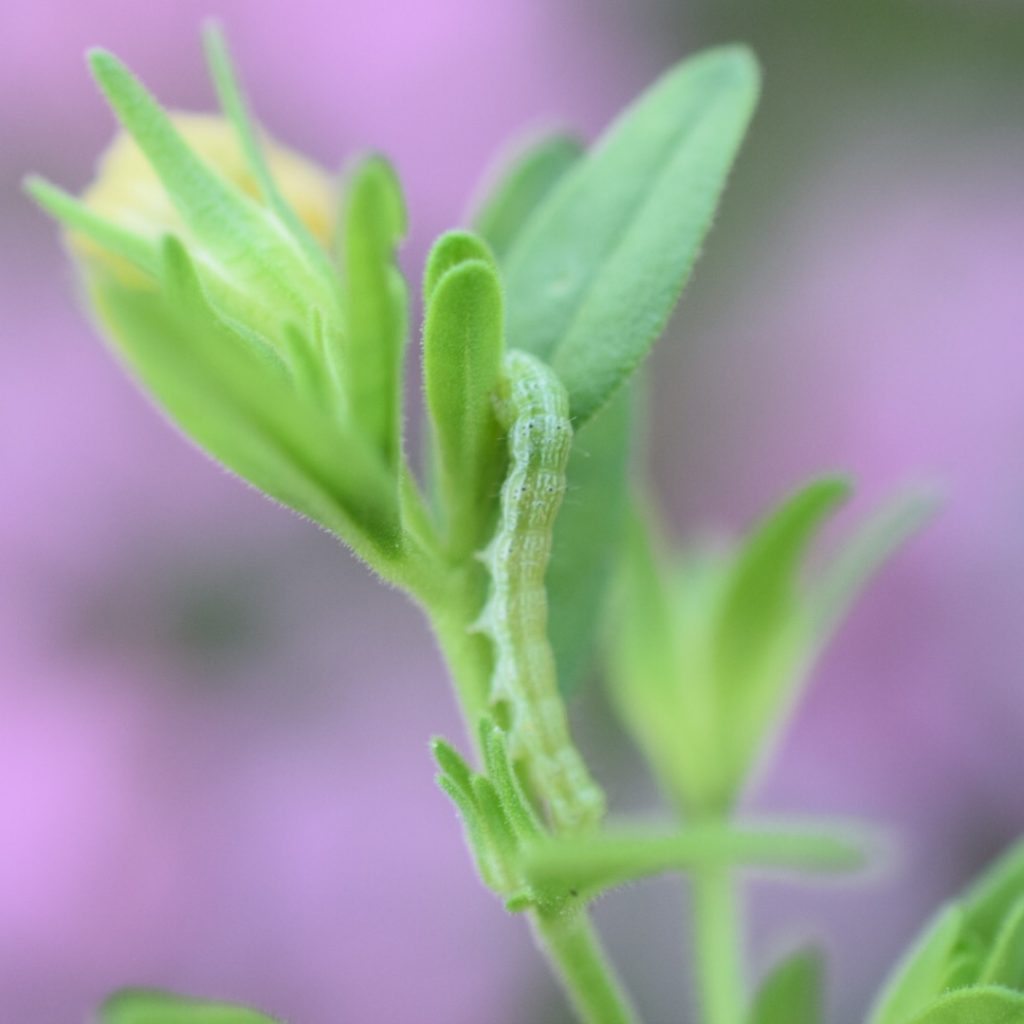
Budworm is a generalized term for the caterpillars of various moths. There are lots of different species but they all do one thing- eat the crap out of your flowers to the point where you will have no flowers. This can happen very quickly. Trust me. Some telltale signs that you have a budworm issue are: holes in flowers, flower buds, and leaves; black pellet-like droppings on plants; and a general lack of blooming. And of course, if you look close enough, you can see them all over your plants. They can be hard to spot because there are smart ones that will hide under leaves and smarter ones that will take on the coloring of the plant they are feeding on. There are super tiny baby ones too that will just burrow into buds where you can’t see them. The budworm in the picture below was completely enclosed in the geranium bud. The only sign that it was in there was a tiny pinprick hole that I noticed. Opening the bud revealed the little beast.
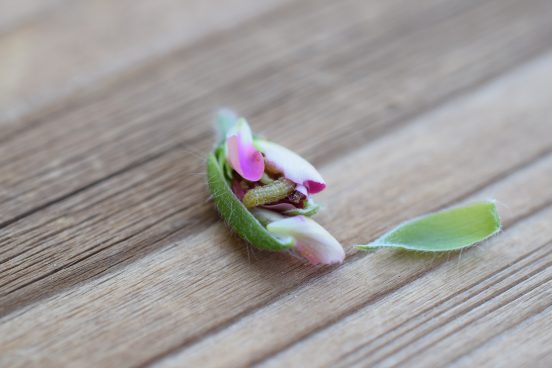
First Line of Defense- Removing The Eggs
The eggs are tiny and white, but can be seen with the naked eye. They are especially easy to spot on geranium buds and can be handpicked and disposed of (I prefer vengeful squishing). Spotting the eggs and removing them is my first line of defense to preventing an outbreak, but eventually I become overwhelmed by the sheer numbers, especially when they have been laid all over a large petunia plant.
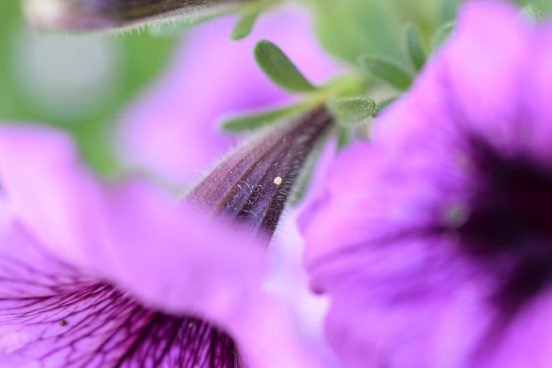
Second Line of Defense- Consistent Spraying
Once the eggs show up, it is important to begin a spraying regimen once a week with an insecticide that targets budworms. My favorite spray is Monterey B.t. It is OMRI listed for organic gardening. I purchase it from Amazon. The active ingredient is Bacillus thuringiensis, a type of bacteria found naturally in soil. The budworms feed on the treated leaves and flowers, get sick, and die. It does not harm beneficials, but be sure to spray towards dusk when bees and butterflies are not active. It did not discolor my white or light colored blooms (not that it would have mattered much considering they were full of holes and tattered). Be sure to cover all surfaces of susceptible plants including buds and flowers and underneath leaves as best you can. It’s awesome and it works. It’s the reason that I have been able to grow petunias and geraniums again. It does not affect eggs, so it must be sprayed again as each new generation hatches.
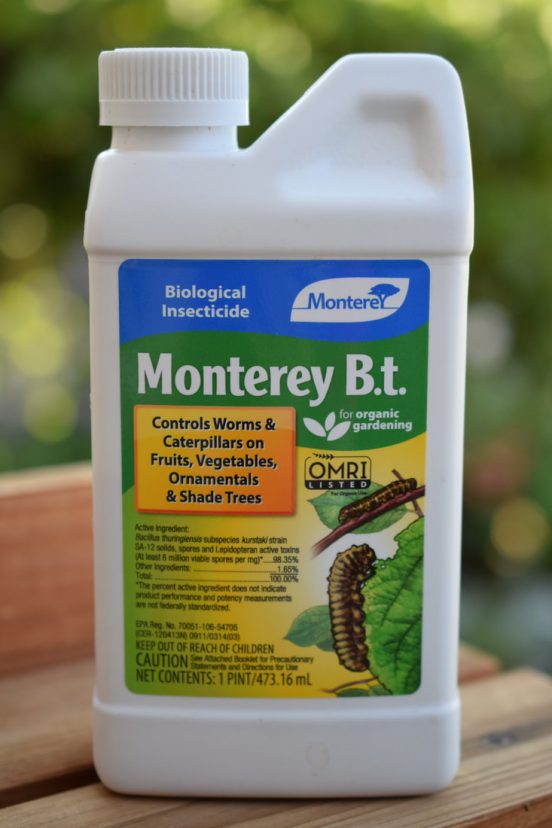
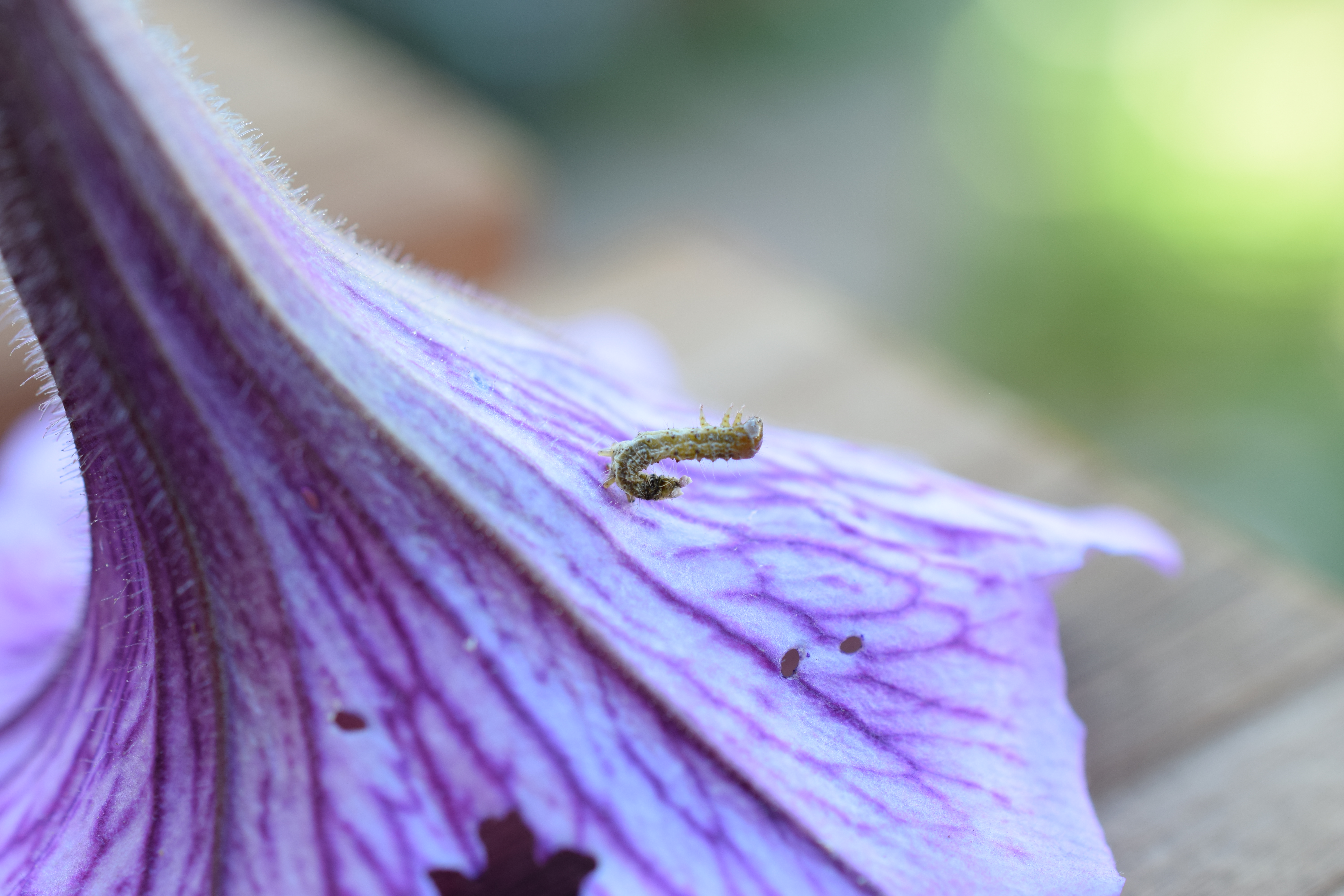
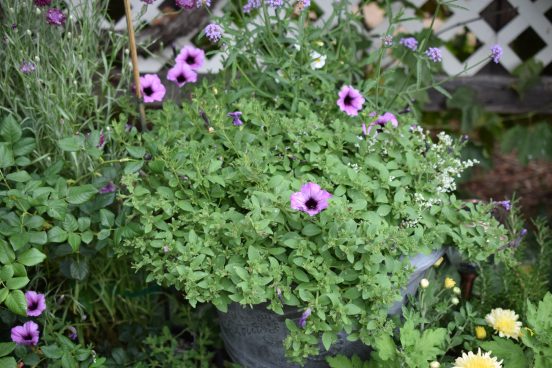
Third Line of Defense- Keep Spraying CONSISTENTLY
Don’t be like me. Don’t spray once and then stop. Because if you live in Mothville USA like I do, the eggs don’t stop hatching and the budworms don’t stop feasting. If you have one plant, you can probably have success with handpicking the caterpillars off every day. If you have several, I’m here to tell you that this just doesn’t work. The picture above proves it. If only I could get back the hours I’ve spent bent over plants handpicking worms in the dark with a flashlight. As those hours added up I really started to question my decision not to spray, because it wound up costing me time, heartache, and flowers. So spray once a week and handpick any worms that you happen to see when you are out in the garden tending your plants. I sprayed my plants a few days ago and plan to keep doing so. I miss my beautiful plants full of lovely blooms.
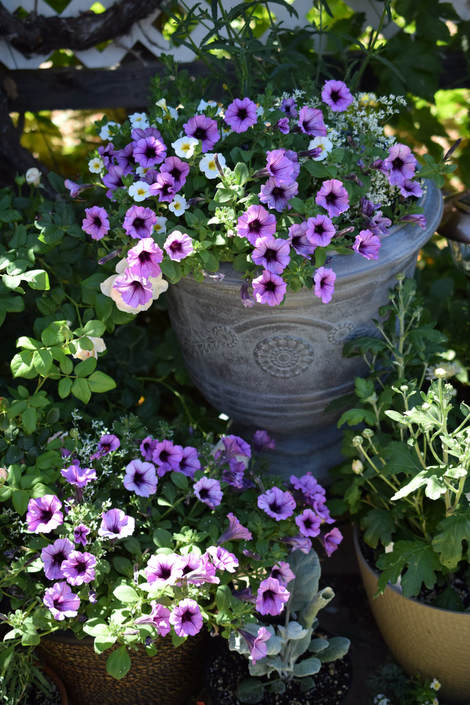
I hope you found this post helpful! I would love to see your comments and questions in the space below. Are you dealing with those other terrible pests in the garden- leafhoppers and thrips? Then check out THIS POST all about sticky traps that help to keep populations in check! If you would like to see daily updates from my garden join me on Instagram and Facebook!
Happy gardening!
Heather
Related Posts
Sticky Traps- Organically Controlling Pests in the Garden
If you are searching for an organic control for pests in the garden such as…
06/08/2020

Julie | 24th Aug 20
I feel like I could’ve written this post! I must go outside 103 times a day hunting! I don’t squish them though, I throw them. Angrily. As far as I can. And I may or may not have added them to my bird feeder. I hope this does not make me a bad person but it is just SO gratifying.
Heather | 24th Aug 20
LOL that is awesome Julie! Handpicking does help!
Lisa | 26th Aug 20
Same here Julie!
In a couple days all but a few of flowers were gone. Recently, I noticed a few worms during the day and holes here and there on the foliage, some pedals too. My flowers seemed ok.
We had a rain storm..and 2 days later, all the flowers petals were gone.
It puzzled and angered me because I lost a huge beautiful bed of flowers. I’ve been a gardener for years and moved to a new location. I figured out something was wrong when I noticed other places around town still have petunias.
Mine were magnificent..the best I had in years. Its apparent the worms thought so too. Is there anything that kills them completely?
I want to plant tulip bulbs in another month or so and wondering if the worms will attack them too next spring when they bloom.
Gregory Ellul | 26th Aug 21
This post is great! Lots of Educational stuff that help Ed me. Thank you
Heather | 27th Aug 21
Thank you so much!
Debbie Lynch | 10th Jun 22
I could have written this too! I go out several times a time to pluck the worms off. But I feed them to the many lizards in my Arizona yard! It’s a sick circle of life that gives me great pleasure.
Now off to buy the mentioned spray…
Debbie Lynch | 10th Jun 22
I go out several times a time to pluck the worms off. But I feed them to the many lizards in my Arizona yard! It’s a sick circle of life that gives me great pleasure.
Now off to buy the mentioned spray…
Heather | 14th Jun 22
LOL that is awesome Debbie!
Emily | 9th Aug 22
Thank you!!
Heather | 11th Aug 22
Thanks for stopping by Emily!
Becky Parker 65yr Oklahoma | 22nd Aug 22
Question
I started with fresh soil in a large patio pot. For two months I had beautiful overflowing blooms that I could prune and get fresh blooms. No more! Had to discard the plants. Now, can I repot a thriving Sun patients in the same soil? Should I treat the soil? Will the worms attack them too.
Heather | 22nd Aug 22
Hi Becky, you need to be really sure why your plant died. The budworms will eat all the blooms off the plant, but they won’t actually kill it. If you discarded the plant because it was no longer blooming, but it was still healthy, then it would be ok to use the same soil because budworms come from butterflies and moths, not the actual soil. If you do reuse the soil make sure to add some slow release fertilizer because it is likely quite low in nutrients after two months of hosting a vigorous plant. Hope that helps!
Marie | 31st Jan 23
I have many planters with petunias in them. For the last two years I’ve had budworms for the first time. Spraying every week all summer long got too expensive! I’m considering giving up on petunias although I love them. Looking for some showy annuals for pots to take their place. Any ideas?
Heather | 31st Jan 23
Hi Marie! You can try spreading your spraying out to once every two weeks. There really is nothing that provides such continuous blooming and withstands the heat like petunias. Zonal geraniums are up there too, but the budworms love those also =( They don’t go for euphorbia (such as Proven Winners’ Diamond Frost) or sweet alyssum quite as much. But honestly, in my garden they will pretty much eat everything else. I was pretty lax on spraying last year and still had plenty of flowers to enjoy.
Angie | 9th May 23
I have had horrible problems with budworms. I’ve tried everything! I tried Seven incecticide last year. That slowed them down but I still eventually lost my flowers. It rains a lot here and the Seven washes away and is ineffective, even after spraying every other day. Budworms are insidious! I noticed budworms won’t eat verbena, impatiens or Dipladenia. I’m trying to find other flowers they avoid. Petunias are my favorite, but it’s a losing, painful battle so I’ve given up. So sad. Any suggestions on other flowers budworms will leave alone?
Heather | 29th May 23
Hi Angie, I’ve had luck with budworms leaving salvia, gaura, sunflowers, zinnias, cosmos, nicotiana, and scabiosa alone for the most part. Petunias and pelargoniums really are their favorite.
Cindy Coan | 14th Jun 23
Last summer, after losing my petunias to what I now think must have been budworms, I replaced them with vincas. Those plants did well all summer; the flowers were bright and colorful, and they don’t seem to be vulnerable to budworms as petunias are. From what I’ve read, the budworms in question mainly go after petunias, geraniums, and tobacco plants. (Because of their attacks on the latter, they’re sometimes known as tobacco worms.) This year, my new petunia blossoms are once again being eaten by budworms. I’ve begun spraying them with Bt (hope to continue applying that once a week), and I’ll see if that helps me get some flowers back.
Heather | 12th Jul 23
Hi Cindy, hope the BT has been helping this year!
Tracy | 21st Jul 23
Petunias are one of my very favorite flowers that add so much color to my garden. They do so well in my climate but this year I have a budworm infestation taking them down fast. I have BT ordered and on the way, but I’m so upset about this infestation I’m considering not doing petunias next year. I’ve been growing them for a while and never had this problem but what a pain! And an expensive one I don’t need! If I don’t see great results with the BT I think I’m over with petunias. I have planted mine in masses and it’s just a mess! Thank you for the information you provided and I hope for all of us that we can continue enjoying our petunias and geraniums.
Heather | 31st Jul 23
Hi Tracy, it is a bummer when the budworms arrive! Hope the BT is working out well for you!
Budworms Must Die | 26th Jul 23
These horrid things are the scourge of my beautifully mass-planted petunias. At first, I thought grasshoppers were shredding them, until I saw a large black caterpillars AND budworms. After a quick Google search, the monsters were identified. I’ve cut back the damage, sprayed them with BT, now to wait and watch. This is the third year I’ve chosen petunias and angelonia as my favorite mass planted annuals as they withstand the beating sun so well. This is the only year I’ve had a problem, but now that I’m educated, will be on top of it in the future. I’m ready for another show of my beloved petunias! 😭
Heather | 31st Jul 23
Hope your petunias recover quickly! I have found that for perfect flowers weekly spraying is required. If you spray every two weeks it is less work, but you will likely have nibbled blooms.
Linette | 9th Sep 23
Are budworms the reason the leaves have dried out? Are they sucking the roots?